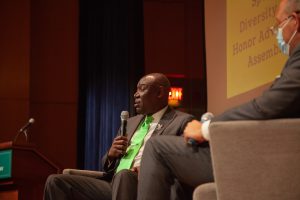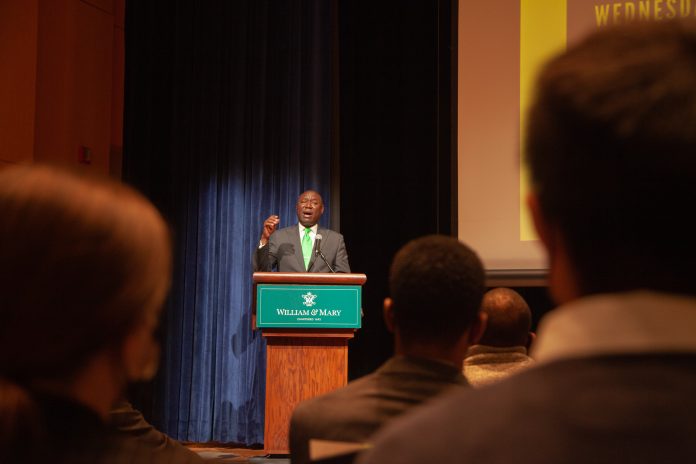Wednesday, Feb. 9, the College of William and Mary hosted renowned American Civil Rights attorney and social justice activist Benjamin Crump for the Annual Dr. Martin Luther King, Jr. Commemoration. Sponsored by multiple campus organizations– including The W&M Center for Student Diversity, Honor and Conduct Councils and Conduct & Honor Advisors Program– the event was part of the College’s 2022 Ethics Week.
The event featured a memorial honoring Dr. King by brothers of the Kappa Pi Chapter of Alpha Phi Alpha Fraternity, Inc., a lecture by Benjamin Crump and a Q&A session with Crump moderated by Law School Dean A. Benjamin Spencer.
Crump began his speech to the auditorium of students, faculty, staff and other remembers of the Williamsburg community with a story of one of his clients, Reginald Lee Fletcher Jr.. Fletcher was part of the “Virginia Three”– a group of three Black men wrongfully accused of murder and sentenced to 25 years in prison. Crump helped the Virginia Three with their case, but he still feels that the outcome of their case represents an ongoing struggle.
“We made progress and saw that all three of them were at least paroled and released from prison. However, they are still shown as convicted felons for murder,” Crump said. “Could you imagine trying to get a job when you have to put on your application that you are a convicted felon of first degree murder? So, we are still trying to exonerate these three young men who literally had 25 of their years stolen.”
Crump introduced Fletcher, who then stood up and received a standing ovation from the audience. The injustices that Black Americans like Fletcher face in this nation was a focal point of Crump’s speech, which centered around three ways that citizens can turn civil wrongs into civil rights.
“The first way we change civil wrongs into civil rights is making sure that the Declaration of Independence isn’t just some rhetoric, but it’s something that we really believe in our hearts,” Crump said.
“The first way we change civil wrongs into civil rights is making sure that the Declaration of Independence isn’t just some rhetoric, but it’s something that we really believe in our hearts.”
Crump also addressed the notion that true social justice reform starts with individuals introspectively evaluating how they contribute to an egalitarian society. This process begins when citizens address their implicit biases and learn to overcome them in the name of the founding self-evident truth of America that all men are created equal.
“You have to first say: ‘I want to take all my biases out and try to judge people by the content of their character and not by the color of their skin.’ That is the first way that we get an opportunity to change civil wrongs into civil rights,” Crump said.
Throughout his speech, Crump referenced Dr. King often, fitting with the theme of the ceremony. Brothers of the Kappa Pi Chapter of Alpha Phi Alpha Fraternity, Inc. led a memorial for Dr. King before Crump took the stage. Dr. King was a member of Alpha Phi Alpha Fraternity, Inc. at Boston University.
One of the brothers in the memorial, Matthew Nwaneri ’23, discussed how he visited the Lorraine Motel in Memphis, Tenn., where Dr. King was assassinated. There, Nwaneri learned about King’s work protesting alongside sanitation workers who demanded better pay.
“Learning about his final campaign in Memphis made me think about how fighting for justice doesn’t always have to be done on a large scale. We can effect change wherever we currently are,” Nwaneri said. “We can think about how we treat people and whose important work often goes unseen. I think about William and Mary’s dining staff and the people who clean our living spaces. Following in Dr. King’s footsteps means recognizing these people, it means fighting for them and for the respect that they deserve.”
Crump continued, informing the crowd that the second way to turn civil wrongs into civil rights is to speak truth to power. In this section, he encouraged the crowd to fight for all citizens to have an equal opportunity to achieve the American dream.
Lastly, Crump argued that the third way to turn civil wrongs into civil rights is to educate Americans, specifically young Americans, with the comprehensive history of America and the world.
“Let’s let the children learn about Black history. Let’s let the children learn about Hispanic history. Let’s let the children learn about Native American history. Let’s let the children learn about Asian American history,” Crump said. “Let’s let the children learn about Jewish American history. Let’s let the children learn about American history. All the history. Because all of us contributed to making America the great country that we are today.”

Throughout his speech and in the Q&A session after, Crump discussed many of the prominent cases he has worked on and referenced other notable circumstances of injustices in marginalized communities in recent years.
Many students and audience members, including Kendal Sanders ’24, had recognized Crump’s name from his work with these previous court cases. Sanders is a member of the Conduct & Honor Advisors Program, one of the sponsors of the event.
“I know that he is a very prominent attorney for a lot of the cases pertaining to Black Lives Matter, like Ahmaud Arebery,” Sanders said. “He is a very vocal person in the Black community. So I thought this was a very amazing opportunity to come and see him speak at William & Mary.”
Crump specifically mentioned the Ahmaud Arbery case when discussing the idea of giving all children an equal opportunity at the American dream.
“What we want is Breonna Taylor, our sister, to be able to sleep in peace and not have the Louisville Metropolitan Police bust open her front door at 1:00 in the morning and execute her with nine bullets in her body while she is practically naked in her nightgown. What we want is to give Amaud Arbery an opportunity to run free without a lynch mob – not in 1940, not in 1950 – but a lynch mob in 2020, in your day, lynching him for jogging while Black in Brunswick, Georgia in broad daylight,” Crump said.
“What we want is Breonna Taylor, our sister, to be able to sleep in peace and not have the Louisville Metropolitan Police bust open her front door at 1:00 in the morning and execute her with nine bullets in her body while she is practically naked in her nightgown. What we want is to give Amaud Arbery an opportunity to run free without a lynch mob – not in 1940, not in 1950 – but a lynch mob in 2020, in your day, lynching him for jogging while Black in Brunswick, Georgia in broad daylight.”
After the ceremony, Victor Green ’22, a member of the Kappa Pi Chapter of Alpha Phi Alpha Fraternity, Inc. shared his takeaways from Crump’s speech.
“Personally, I was just glad to have him on campus to speak, especially given the current political climate. I know we have a lot of issues right now, especially with the recent election of Glenn Youngkin. It’s a time where a lot of people feel like Black voices, especially in education, are being suppressed. So to have him come to the school to speak about these civil rights issues, about how we can make sure our voices are being heard, is very inspiring. I feel like a lot of people gained a lot from this talk, myself included,” Green said.
The Annual Dr. Martin Luther King, Jr. Commemoration with Benjamin Crump was part of Ethics Week 2022 and part of the larger celebration of Black History Month at the College.





























